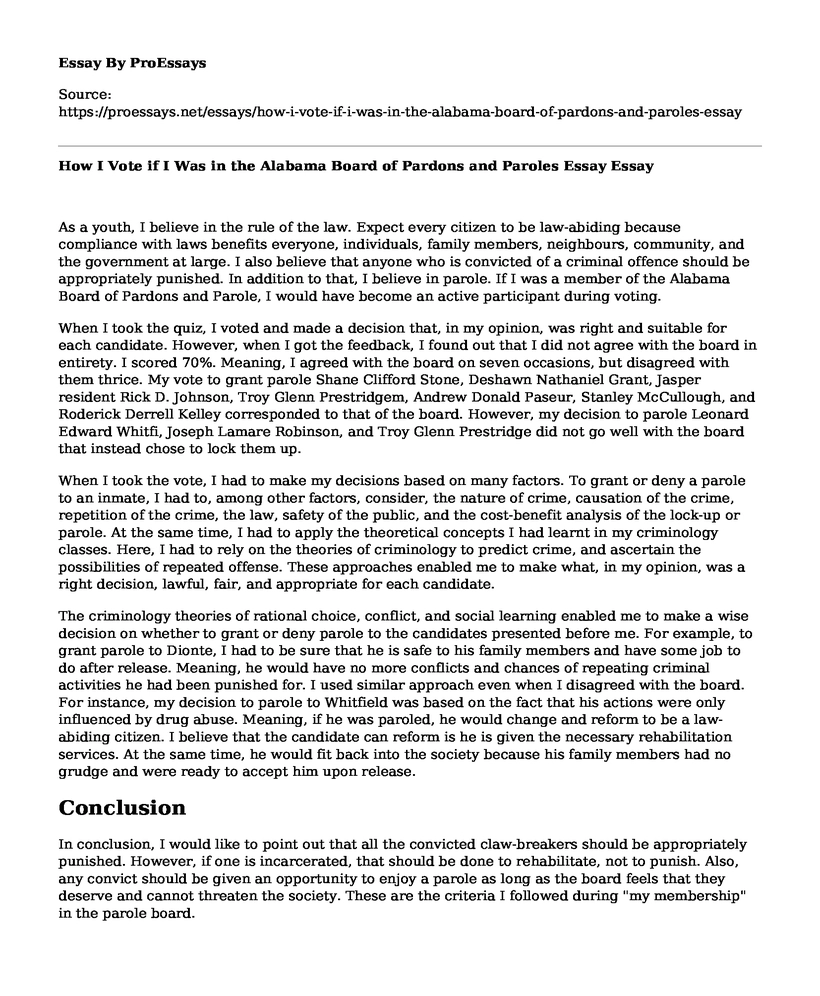As a youth, I believe in the rule of the law. Expect every citizen to be law-abiding because compliance with laws benefits everyone, individuals, family members, neighbours, community, and the government at large. I also believe that anyone who is convicted of a criminal offence should be appropriately punished. In addition to that, I believe in parole. If I was a member of the Alabama Board of Pardons and Parole, I would have become an active participant during voting.
When I took the quiz, I voted and made a decision that, in my opinion, was right and suitable for each candidate. However, when I got the feedback, I found out that I did not agree with the board in entirety. I scored 70%. Meaning, I agreed with the board on seven occasions, but disagreed with them thrice. My vote to grant parole Shane Clifford Stone, Deshawn Nathaniel Grant, Jasper resident Rick D. Johnson, Troy Glenn Prestridgem, Andrew Donald Paseur, Stanley McCullough, and Roderick Derrell Kelley corresponded to that of the board. However, my decision to parole Leonard Edward Whitfi, Joseph Lamare Robinson, and Troy Glenn Prestridge did not go well with the board that instead chose to lock them up.
When I took the vote, I had to make my decisions based on many factors. To grant or deny a parole to an inmate, I had to, among other factors, consider, the nature of crime, causation of the crime, repetition of the crime, the law, safety of the public, and the cost-benefit analysis of the lock-up or parole. At the same time, I had to apply the theoretical concepts I had learnt in my criminology classes. Here, I had to rely on the theories of criminology to predict crime, and ascertain the possibilities of repeated offense. These approaches enabled me to make what, in my opinion, was a right decision, lawful, fair, and appropriate for each candidate.
The criminology theories of rational choice, conflict, and social learning enabled me to make a wise decision on whether to grant or deny parole to the candidates presented before me. For example, to grant parole to Dionte, I had to be sure that he is safe to his family members and have some job to do after release. Meaning, he would have no more conflicts and chances of repeating criminal activities he had been punished for. I used similar approach even when I disagreed with the board. For instance, my decision to parole to Whitfield was based on the fact that his actions were only influenced by drug abuse. Meaning, if he was paroled, he would change and reform to be a law-abiding citizen. I believe that the candidate can reform is he is given the necessary rehabilitation services. At the same time, he would fit back into the society because his family members had no grudge and were ready to accept him upon release.
Conclusion
In conclusion, I would like to point out that all the convicted claw-breakers should be appropriately punished. However, if one is incarcerated, that should be done to rehabilitate, not to punish. Also, any convict should be given an opportunity to enjoy a parole as long as the board feels that they deserve and cannot threaten the society. These are the criteria I followed during "my membership" in the parole board.
Cite this page
How I Vote if I Was in the Alabama Board of Pardons and Paroles Essay. (2022, Oct 20). Retrieved from https://proessays.net/essays/how-i-vote-if-i-was-in-the-alabama-board-of-pardons-and-paroles-essay
If you are the original author of this essay and no longer wish to have it published on the ProEssays website, please click below to request its removal:
- Ethical Hacking as a Means of Improving Cybersecurity
- Design of the United States Constitution Essay
- Programs of Assisting Victims of Crime Essay Example
- Essay Sample on IRS Scams and Tax Fraud
- Essay Example on God Bless the Child: US Response to Juvenile Prostitution
- Paper Example on Analysis of MLK's Speech 'I've Been to the Mountaintop'
- Gang-Influenced Drug Abuse, Crime, and Violence - Essay Sample







